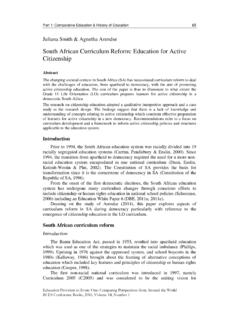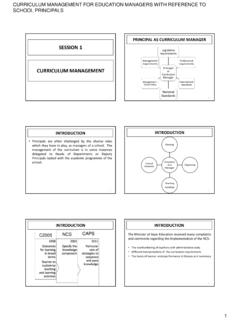Transcription of EDEN THS LIFE ORIENTATION GRADE 10 CLASS NOTES …
1 1. EDEN THS. life ORIENTATION . GRADE 10. CLASS NOTES . TERM 1. 2. Chapter 1 : Development of the self in society 1. Strategies to develop self-awareness, self-esteem and self-development Concepts Self-awareness Self-esteem Self-development How good you know How much you like yourself How you improve yourself yourself regarding interests, and how confident you are. by building up your skills, strengths and strengths, improve your weaknesses, likes and weaknesses, develop your dislikes, goals, values and life skills and become the beliefs.
2 Best person you can be. Factors that influence self-awareness and self-esteem What other people say about you What happens in your life How well you cope with challenges How you respond to successes and failures How popular you are The media newspapers, magazines, TV, and all social media sources like Facebook, Mxit, etc. Strategies to build confidence in yourself and others Good communication skills Assertive attitude - Say what you want to say clearly - Be positive and respectful - Know what you want - Have a tall and straight body posture - State your viewpoint clearly - Be polite Complete tasks and projects successfully by managing your time effectively Participate in community organisations Make good decisions - Evaluate the situation - Get information about the different options - Consider the consequences of each
3 Decision - Choose the best option - Act on your decision 3. 2. Power and gender Concepts Term Explanation Gender Roles, behaviours, activities and qualities that society sees as suitable for men / women. Gender is learnt, it is not a biological function. Sex Biological qualities that define men and women. Female and male Groupings according to sex. Feminine and masculine Grouping according to gender. Power relations Sharing of power between people in a relationship. You may have a dominant and a submissive partner in a relationship.
4 Dominance is often determined by gender and sex. Men have traditionally more power than women. Differences between a woman and a man The most obvious differences between the sexes are biological in nature. Example : Women Men Menstruate No menstruation Ovaries that produce eggs Testicles that produce sperm Have two x chromosomes ( XX ) Have one X and one Y chromosome ( XY. ). Vagina is inside the body Penis is outside the body Give birth Do not give birth Smaller and lighter with less bone Taller and heavier with more bone mass mass Less upper body strength More upper body strength More white blood cells More red blood cells Puberty starts two years before boys Puberty starts two years after girls Fertility lessens after the age of 35 Fertile till old age Higher levels of the hormone Higher levels of the hormone testosterone oestrogen Less body hair More body hair Skull is thinner
5 And weaker Skull is thicker and stronger Have to work harder to build muscle Build muscles easily 4. Stereotypical views of gender roles and responsibilities Women may earn less than men for certain work Men are promoted to positions of power instead of women Men are allowed to smoke, drink and have affairs in some societies, while women are not. Male sports teams get more funding and media coverage than women teams. Women have to do more housework than men. Women play a larger role in parenting. Some careers are traditionally seen as just for men.
6 Influence of gender inequality on relationships and general well-being Sexual abuse and violence - When women/girls are involved in relationships where power is not equal, men may decide on the conditions under which sex happens. This may mean forced sex. - Includes rape, incest and violent sexual acts. - Some men are violent toward women and beat them up. Teenage pregnancy - Peer pressure - Lack of information - Poverty - Rape - Forced to get pregnant to prove fertility STIs including HIV/AIDS. - Women have no say in the use of protective measures - Age-mixing in a relationship ( sugar daddies / sugar mommies ).
7 - More than one partner - Transactional sex ( sex that is paid for ). - Rape 5. Chapter 2 : Physical education : Fitness 1. Value of participating in exercise programs Types of fitness Type of fitness Explanation Types of exercises Cardiovascular fitness Have a strong heart and walking dancing capillary vessels and a large cycling aerobics lung capacity . running Muscular strength Strong muscles and tendons. Weight lifting Step climbing Resistance exercises Endurance The ability to exercise for a Cycling long time without getting tired.
8 Jogging swimming Flexibility The ability to move your joints Stretching and use your muscles through Swimming their full range of motion. Yoga Why regular physical activity ? Reduces stress, worry and depression Helps you to relax Makes you feel more confident Helps you to sleep well Improves brain functioning 6. Chapter 3 : Careers and career choices 1. Self-knowledge for career choices Step 1: Know your interests, abilities, talents and strengths and weaknesses Concept Explanation Interests What you like to spend your time doing.
9 What you want to learn more about. Abilities The things you can do well. The skills you posses. Talents The natural abilities you were born with. Strengths The things that you are always good at. Weaknesses The things you struggle with / not good at doing. A B C. PERSONALITY PERSONALITY CAREER GROUP AND INTEREST. TYPE TRAIT. Natural Prefer/like to work with your hands, tools and machinery make or repair articles, look after plants and animals, like Open outdoor work. Includes services such as cooking, making clothes, cutting hair, repairing and installing office and home REALISTIC Honest equipment, growing, breeding and caring for animals or plants, construction and maintenance of roads, pipelines, Modest buildings, etc.
10 , operation of heavy vehicles and machinery like bull-dozers, fork-lifts, trucks and buses, manufacture, Shy repair or service machinery or electrical tools, engineering Perseverance such as building bridges, designing aircraft, surveying or writing computer programs. Practical Steadfast Careful Prefer to work on their own in a research environment, to Critical investigate and discover new facts, conduct experiments and INVESTIGATIVE observe with scientific equipment to find solutions, analytical Inquisitive and mental activities aimed at problem solving and application of knowledge Independent Systematic Modest Precise Reserved Complicated Enjoy to work in an artistic environment which includes writing stories or plays, acting on stage.





